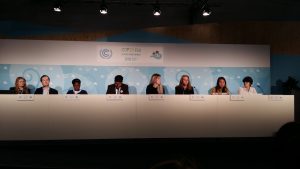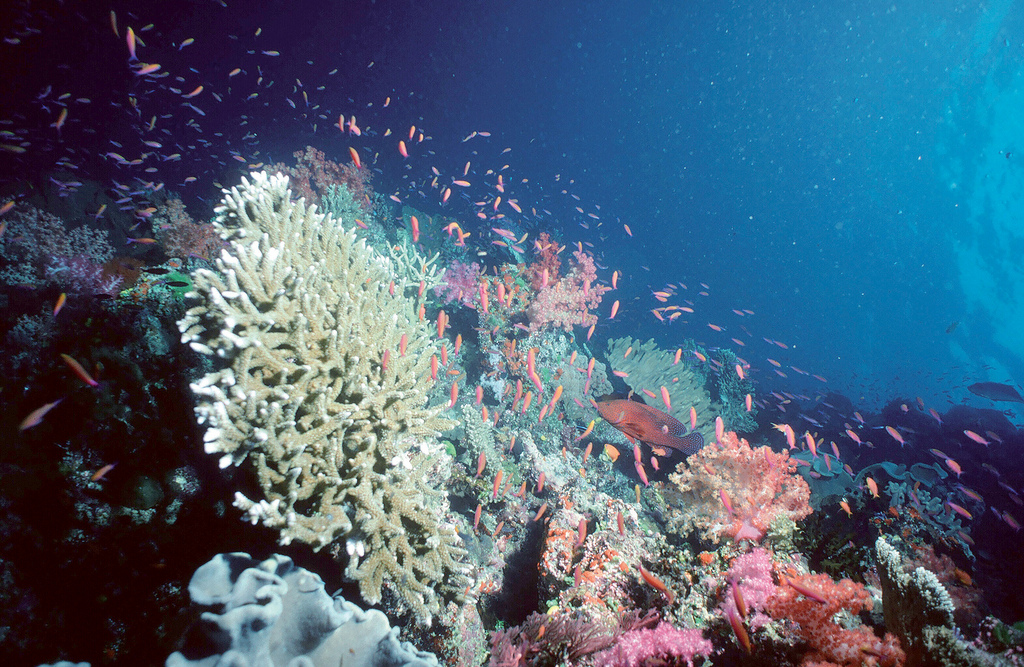
The planet is getting warmer, and will continue to do so indefinitely. Within the United Nations climate change discussions, world leaders, scientific experts, industry stakeholders, and civil society are negotiating ways of collectively reducing greenhouse gases and financing loss and damages incurred as a consequence of increased warming. The big overarching goal is to halt warming to 1.5 or 2 degrees, however the most recent UNEP Emissions Gap report concluded that even if all countries meet their nationally determined contributions to the Paris Agreement, we will still exceed 2 degrees warming (1). It is clear that countries need to set more ambitious contributions, and possibly find other methods of reducing greenhouse gas emissions.
Given this, allow me to present a tidbit of science. In a study published in Geophysical Research Letters, researchers determined that if the same amount of heat that has been added to the top 2 km of the global ocean between 1995 and 2006 were instead added to the bottom 10 km of the atmosphere, we would have experienced a 36-degree Celsius increase in global average temperatures (2). In other words, the giant mysterious blue mass that covers about 70% of the planet’s surface area is absorbing the vast majority of the excess heat produced by the greenhouse effect. The oceans also are our planet’s largest carbon store. Seawater doesn’t do this job alone- organisms like phytoplankton, seaweed, seagrass and mangrove plants all play a significant role in trapping carbon through photosynthesis. Eventually this carbon gets eaten by animals like invertebrates, fish, and mammals, and exported to the bottom of the ocean where it sits there for long period of time, not participating in the greenhouse effect.
So in the quest to limit global warming amidst all the talk about land use, financial mechanisms, and education, one thing is clear- protecting our ocean’s capacity to store carbon and absorb heat might be one of the most direct and effective solutions available to us.
As a marine biology student and youth delegate to COP this year, I was keen to follow ocean-related topics in the UN Climate discussions to see where I could make an impact. While researching and preparing for the conference, it struck me that oceans were barely acknowledged anywhere within the UN Framework Convention on Climate Change (UNFCCC) discussions. Article 1 of the Paris Agreement does broadly note “… the importance of ensuring the integrity of all ecosystems, including oceans”. It appears, however, that in terms of real action, many of the most powerful Parties to the Agreement (Japan, US, Canada, Australia, EU) do not recognize ocean conservation and ocean-mediated mitigation strategies as important and useful instruments for combatting climate change. These countries among several others do not mention oceans at all in their nationally determined contributions (NDCs) to the Paris Agreement.
Fortunately, COP23 was a turning point for the ocean dialogue in UN climate discussions largely thanks to the Fiji Presidency. I- alongside other youth, scientists, and citizens of coastal states- contributed to laying down this groundwork in Bonn, and there remains a lot more work ahead of us.
Fiji’s Ocean Pathway Partnership (OPP)
The ocean agenda started gaining momentum earlier this year in June with the first ever UN Ocean Conference in New York. The justification was a seriously lack of progress on Sustainable Development Goal number 14- life under water- which requires that we collectively “conserve and sustainably use the oceans, seas and marine resources for sustainable development”.
The COP23 Fiji Presidency also gave the topic a much-needed push to be introduced as a more mainstream UN climate topic. Though the Presidency doesn’t have any special agenda-setting powers within negotiations (it is still a Party-driven process), their leadership was a powerful symbol that had influence over the tone and direction of discussions. There was a huge emphasis on the fact that Fiji, like many other Small Island Developing States (SIDS), are experiencing the most severe consequences of climate change like sea level rise, more frequent extreme weather events, and food insecurity.
The Oceans Pathway Partnership (OPP) is an initiative that was officially launched by the Fiji Presidency in a side event at COP23. It is a collective of Parties, non-party stakeholders, ocean NGOs and IGOs, and scientific experts that will meet outside of COP’s to work towards strengthening the role of oceans in the UNFCCC. This would entail getting countries to include ocean-related projects in their NDCs, such as reducing agricultural runoff to the sea, restoring blue carbon habitat, improving the sustainability of shipping traffic, and creating financial pathways to promote adaptation projects that will also promote ocean health. The partnership will hopefully strongly engage in the 2018 Talanoa Dialogue (or facilitative dialogue that will create the Paris implementation rulebook), and possibly result in a work programme much like the one on Loss and Damage.
Finding my own pathway for ocean advocacy

Mirroring the structure of the conference itself, the youth constituency within UNFCCC (YOUNGO) also divides and conquers by topic area. Young people have created their own working groups on Loss and Damage, Gender, Agriculture, Finance, and to my delight, Oceans. I joined the Oceans working group at the Conference of Youth (COY13) in the days leading up to COP. Doing advocacy work through YOUNGO was a very effective way at doing my part to lobby for the OPP because the constituency is officially recognized by Secretariat as the unified voice of young people around the world. I spoke about the oceans in YOUNGO’s press conference, chatted with scientists and party members about the OPP to spread awareness, and hosted a side event with the Fiji Presidency to get stakeholder feedback on how the OPP could work.
Our immediate next goal as a working group is to create a website tied to the OPP called the Ocean Wishlist. This is an outcome of the side event we hosted with the Presidency- our vision is for it to list all the tangible outcomes stakeholders are hoping to see from the OPP, and track whether or not these outcomes are being met by featuring specific projects or policy outcomes.
An emerging marine scientist’s recommendation to Canada regarding oceans
As a young Canadian whose love and appreciation of the ocean was born of an upbringing in coastal British Columbia, I dream of our country being recognized as a world leader in ocean conservation. Canada has over 200 000 km of coastline (the longest of any country in the world). and a wealth of coastal resources that have been mindfully managed by First Nations for thousands of years, It is therefore shocking to me that Canada barely does not mention coastal ecosystems in their nationally determined contribution (NDC) to the Paris Agreement. This is not to say that we have done nothing for marine conservation, but rather that there is a window of opportunity to highlight what we are currently doing as it pertains to climate change, and be a leader as a Global North state. I could list dozens of actions that should be taken to ensure healthy oceans and coastlines, but many of these I am therefore proposing three specific recommendations that are not being discussed as much but just as critical:
1. Sign the Marine Arctic Peace Sanctuary (MAPS) treaty. As permanent ice cover in the Arctic recedes, we need an international agreement that will ensure that states do not exploit this climate change-induced opportunity to over-harvest Arctic fisheries and initiate Arctic off-shore drilling for oil. Not only is this ethically wrong, but it will add to the existing damages done to Arctic marine ecosystems, and is contrary to the logic of keeping global warming to 2 degrees. The MAPS treaty has already been drafted and sent to all UN member states as an addendum to the UN Convention on the Law of the Sea.
2. Recognize that refusing to be serious about fighting climate change will have direct negative impacts on coastal species that have been an integral part of First Nations and Inuit culture and livelihoods for generations. This acknowledgement will further affirm Canada’s support and leadership role in implementing the Local Communities and Indigenous Peoples Platform.
3. Continue increasing the percentage of no-take Marine Protected Areas in Canadian waters, and let it be known (in our NDC) that this is a way in which we are mitigating the negative impacts of climate change. This way, other countries may be more inclined to follow suit.
Sources
1. United Nations Environment Programme (UNEP). The Emissions Gap Report 2017: A UN Environment Synthesis Report. (2017).
2. Levitus, S. et al. World ocean heat content and thermosteric sea level change (0-2000m), 1955-2010. Geophys. Res. Lett. 39, 1–6 (2012).
